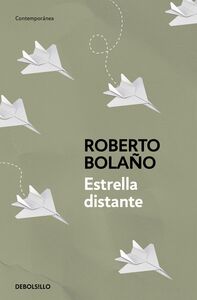You need to sign in or sign up before continuing.
Take a photo of a barcode or cover
challenging
dark
funny
informative
mysterious
reflective
tense
slow-paced
Strong character development:
Yes
Loveable characters:
Complicated
Diverse cast of characters:
Yes
Flaws of characters a main focus:
Yes
Distant Star struck me as a combination of 2666 and The Savage Detectives further reduced to miniature (like... 1400 pages to 150 pages miniature). The themes are all present as is his style. Though I read DS after both of the others and enjoyed the look-back it is actually probably a perfect introduction/entry-point to Bolano
It's Roberto Bolaño, but only three-star Bolaño...
Let it be known that I love this writer's works, and 'The Savage Detectives', in particular. However... this novella has its moments but it's inconsistent. And it's no surprise. It's another of the books based on an incident from a former work (in this case, the highly entertaining 'Nazi Literature in the Americas'). And Bolaño informs us in the preface that he and his fictional alter-ego, Arturo Belano, knocked out the text in six weeks. It shows.
The opening and ending are strong, as they always seem to be with Bolaño. One can envisage his starting with the two bookends then working out how to get from one to the other. There are some strong passages, notably those involving the anti-hero, a Chilean fascist named Carlos Wieder who is a memorably unpleasant sociopath. Then there are other passages where the virtues of this or that poet are mentioned but without giving the reader anything to go on, unless he/she happens to be an expert on Chilean poetry. There are unconvincing depictions of Soviet generals as film stars/heart throbs. These sections remind me of Murakami - and from this reader's perspective, that's not a good thing...
Overall, then, I found this readable but the slightest of Bolaño's works I've read so far.
Let it be known that I love this writer's works, and 'The Savage Detectives', in particular. However... this novella has its moments but it's inconsistent. And it's no surprise. It's another of the books based on an incident from a former work (in this case, the highly entertaining 'Nazi Literature in the Americas'). And Bolaño informs us in the preface that he and his fictional alter-ego, Arturo Belano, knocked out the text in six weeks. It shows.
The opening and ending are strong, as they always seem to be with Bolaño. One can envisage his starting with the two bookends then working out how to get from one to the other. There are some strong passages, notably those involving the anti-hero, a Chilean fascist named Carlos Wieder who is a memorably unpleasant sociopath. Then there are other passages where the virtues of this or that poet are mentioned but without giving the reader anything to go on, unless he/she happens to be an expert on Chilean poetry. There are unconvincing depictions of Soviet generals as film stars/heart throbs. These sections remind me of Murakami - and from this reader's perspective, that's not a good thing...
Overall, then, I found this readable but the slightest of Bolaño's works I've read so far.
Empece el libro sin saber de que iba y realmente me ha gustado, se puede ver porque a pesar que aun estoy luchando por mantener mi concentración lo pude terminar en un día.
Pensé que seria un libro más político y si bien esta ambientado en la época de la dictadura esta se no presenta como el eje de la historia sino más bien como el contexto en el que estos horribles hechos ocurren y y si que son horribles.
Me ha gustado sobre todo el aire impersonal que le da a la novela el hecho que si bien el narrador tiene una cercana relación con el personaje central de la historia, al ver todos estos sucesos desde el extranjero o enterándose de todo por terceras personas y noticias,los lectores nunca realmente se acercan al personaje de Wieder y todos los hechos al final son como historias incompletas que no pueden ser reconstruidas más que por el.
Menciona una cantidad de autores, algunos los conocía y a otros no,pero me ha dejado unas ganas enormes de leer poesía a pesar que probablemente no lo haga porque soy un asco leyéndola.
Pensé que seria un libro más político y si bien esta ambientado en la época de la dictadura esta se no presenta como el eje de la historia sino más bien como el contexto en el que estos horribles hechos ocurren y y si que son horribles.
Me ha gustado sobre todo el aire impersonal que le da a la novela el hecho que si bien el narrador tiene una cercana relación con el personaje central de la historia, al ver todos estos sucesos desde el extranjero o enterándose de todo por terceras personas y noticias,los lectores nunca realmente se acercan al personaje de Wieder y todos los hechos al final son como historias incompletas que no pueden ser reconstruidas más que por el.
Menciona una cantidad de autores, algunos los conocía y a otros no,pero me ha dejado unas ganas enormes de leer poesía a pesar que probablemente no lo haga porque soy un asco leyéndola.
Rise and fall and fall and fall of Carlos Wieder. Twisted brilliant sequel/prequel to "Nazi Literature in the Americas." As usual Bolano effortlessly creates worlds within worlds. He fractures the physics of relationships into a persuasive and fascinating dystopia. Meandering, provocative, and rife with the details you crave.
I liked this quite a bit & am really quite unsettled by it. I'm not done thinking about it yet. Will be interesting to see where I end up after assigned readings & a lecture & class discussion.
Not mind blowing, but really well written and quite a quick read! Also liked the political side of it.


